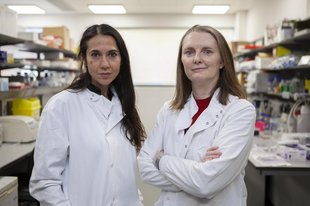Relying on a single biopsy from a single location may not lead to the most effective treatment

Professor Christina Fotopoulou and Dr Paula Cunnea from the Ovarian Cancer Action Research Centre
Our researchers, Professor Christina Fotopoulou and Dr Paula Cunnea of the Ovarian Cancer Action Research Centre, have discovered that there is a lot of variation in a specific genetic marker that doctors usually use to help decide on the best maintenance treatment for ovarian cancer patients.
This discovery suggests that relying on a single biopsy from a single location may not adequately represent the entire spectrum of a patient's tumour profile, potentially leading to suboptimal treatment decisions.
The study provides valuable insights into the complex nature of high-grade serous ovarian cancer, the most common form of ovarian cancer. They analysed tumour samples collected since 2013. What sets this study apart is that multiple tumour samples were taken from each patient from different abdominal sites, whereas the current standard practice is to take only one sample. The researchers wanted to gain a deeper understanding of how tumours differ based on their specific locations.
The findings will help lead us to a step close to more personalised and effective treatments.
"Our study further highlights the complex and variable nature of ovarian cancer tumour biology and how it changes over time. We hope that incorporating this understanding into clinical decision-making will ensure that patients receive the best possible treatment for their cancer."
The results of this study, which Ovarian Cancer Action helped fund, have been published prestigious scientific journal, Cell Reports Medicine, as part of a paper highlighting the complex and variable nature of ovarian cancer and how much tumours vary depending on their location in the abdomen.
Building upon these breakthrough findings, they will continue their work on a larger scale to validate the results. They hope to leverage this knowledge to enhance treatment selection for ovarian cancer patients.